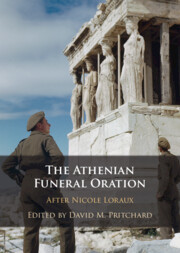Book contents
- The Athenian Funeral Oration
- The Athenian Funeral Oration
- Copyright page
- Contents
- Figures and Tables
- Contributors
- Foreword
- Preface
- Abbreviations
- 1 The Funeral Oration after Loraux
- Part I Contexts
- Part II The Historical Speeches
- 5 The Epitaphios Logos of Pericles: Thucydides’ Ambivalence towards the Genre
- 6 Demosthenes after the Defeat
- 7 Originality and Tradition in Hyperides’ Funeral Oration
- Part III The Literary Examples
- Part IV Intertextuality
- Part V The Language of Democracy
- References
- General Index
- Index of Sources
7 - Originality and Tradition in Hyperides’ Funeral Oration
from Part II - The Historical Speeches
Published online by Cambridge University Press: 11 January 2024
- The Athenian Funeral Oration
- The Athenian Funeral Oration
- Copyright page
- Contents
- Figures and Tables
- Contributors
- Foreword
- Preface
- Abbreviations
- 1 The Funeral Oration after Loraux
- Part I Contexts
- Part II The Historical Speeches
- 5 The Epitaphios Logos of Pericles: Thucydides’ Ambivalence towards the Genre
- 6 Demosthenes after the Defeat
- 7 Originality and Tradition in Hyperides’ Funeral Oration
- Part III The Literary Examples
- Part IV Intertextuality
- Part V The Language of Democracy
- References
- General Index
- Index of Sources
Summary
Nicole Loraux’s great study of the funeral oration stresses the theme of timelessness. Loraux argued that the funeral orators typically presented an account of Athenian military history that avoided any focus on recent military actions. For this argument, Hyperides’s funeral speech presented a difficulty. Loraux described it as the ‘least conformist’ of the surviving speeches and as a ‘subversion’ lacking ‘fidelity’ to the epitaphic tradition. Certainly, the unique features of this speech have always been emphasised since its first publication in 1858. This speech focussed almost exclusively on the recent actions that led up to the public funeral of 322. It also broke with the genre’s general anonymity by singling out the fallen general, Leosthenes, for extensive praise. Loraux tried to account for all this by referring to the ‘exceptional circumstances’ that motivated Hyperides to compose his speech as a eulogy for an individual. This chapter studies closely the timeliness of this funeral speech. It connects the depiction of recent events with Hyperides’ wider political policies. It cautions against regarding the speech as an unusual subversion by recalling how few funeral speeches we have and by linking Hyperides’s speech to other examples of timeliness in what survives of the genre.
- Type
- Chapter
- Information
- The Athenian Funeral OrationAfter Nicole Loraux, pp. 157 - 178Publisher: Cambridge University PressPrint publication year: 2024



